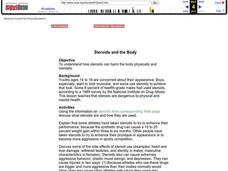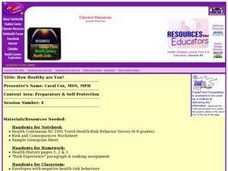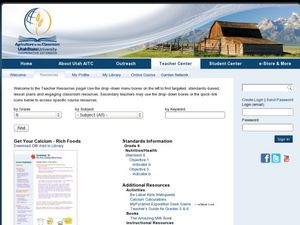Curated OER
Understanding MyPlate
Sixth graders recognize how using the food pyramid can add to their good health practices. In this food pyramid lesson plan, 6th graders build a 3-D food pyramid illustrating the desired amount of each food group.
Curated OER
Religion and Ethics: Living with Special Needs
Students explore human behavior by exploring mental and physical disabilities. In this learning disability lesson plan, students identify the different disabilities students have which prevent them from working at the same pace as the...
Curated OER
The Changing Me
Third graders study the human body. In this health lesson, 3rd graders discuss that everyone's body is growing, measure body parts using a tape measure, and color the body worksheet.
Curated OER
How to Change the World
Biology or health classmates read a case study about a family who is dealing with fetal alcohol syndrome. The PowerPoint that is supposed to be shown is not included, but there are a plethora of web resources that can be used to help you...
Curated OER
Anger (Part 1): Identifying Our Style
Students identify the two common sources of anger. For this psychology lesson, students discuss productive ways to express anger. They complete a reflection worksheet at the end of the lesson.
Curated OER
Respiratory System
In this health worksheet, middle schoolers examine the human body and make mental connections to the target function highlighted in the sheet.
Curated OER
Urinalysis
In this health worksheet, middle schoolers examine the human body and make mental connections to the target function highlighted in the sheet.
Curated OER
Pie Charts
Students create their own pie chart about their total health, being comprised of physical, social, and mental health. They label each section physical, social, and mental, and label each section with the percentage they are trying to...
Curated OER
Steroids and the Body
Students explore how steroids can harm the body physically and mentally.
Curated OER
How Healthy are You?
Students determine how healthy they are. They examine health risk behaviors of adolescents and their consequences. They complete a risk factor survey and discuss why they might take risks.
Curated OER
Girls are Drinking Like Boys
Students explore alcohol use. In this health journalism activity, students read the USA Today article titled "Girls are Drinking Like Boys", respond to discussion questions regarding the article, and complete an activity based on the...
PBS
Stories of Painkiller Addiction: The Cycle of Addiction
Drug addiction, including prescription drug addiction, begins with a reason that's different for every user. High schoolers learn more about the reasons people begin abusing drugs with a set of videos and worksheets that discuss four...
Curated OER
Laughing Matters
Is laughter really the best medicine? Middle and high schoolers discuss the truth behind this adage by reading and discussing a New York Times article about Dr. Patch Adams. They participate in a round-table debate in response to...
Florida Department of Health
Understanding the Risk of Substance Abuse Unit
Teenage brains are different! Understanding that the teenage brain is still developing and thus more impacted by substance abuse is the key concept in a three-lesson high school health unit. Participants learn about how the brain and...
Therapist Aid
Anger Diary
This worksheet provides a log for users to record incidents of anger. Meant to be used as an ongoing diary, the users log times they were angry, their feelings and behaviors surrounding the incident, as well as the results of their...
Global Oneness Project
Deconstructing Consumerism
A short, engaging video provides a critique of the hyper-consumerist mentality that many think have taken over the Western world. After watching the video, pupils reflect on their own habits and use evidence to respond to discussion and...
College Board
2007 AP® Psychology Free-Response Questions
It's hard to make friends, and psychology helps explain why. Learners examine a case study where a new member to a club is looking to form friendships. What helps and what can get in the way? A second question asks scholars to examine...
Curated OER
Grocery Store Problem Solving
Sixth graders explore the effect of healthy diets and exercise on physical and mental wellness. In this health activity, 6th graders compare food intake to the Dietary Guidelines for Americans. Students evaluate levels of activity and...
Curated OER
Another Trip to the Nurse's Office
Students consider the role of the nurse at their school. Using Internet resources and archived articles, they gather information regarding relevant health topics. Students use their information to create pamphlets on health topics...
Curated OER
Calorie Countdown
Fifth graders analyze their caloric intake and energy output. In this nutrition and health lesson, 5th graders use the Dietary Guidelines for Americans to evaluate their personal food intake and activity level. Students explore the...
Curated OER
Introduction To Wellness
Students investigate the affects of various risk factors and cumulative risk factors vs. a life of wellness in this technology-based lesson for the High School Health class. The lesson requires the use of the Inspiration education...
Curated OER
Nutrients
Fourth graders discuss whether they ate breakfast and if so, did their breakfast contain all that their body needs until lunch time. They talk about the definition of nutrients and that every part of their body needs water. They also...
Curated OER
Healthy Living: How Does this Web Site Impact Medicare?
Students assess information on the Health Canada Web site and determine whether such information should be paid for with tax dollars, and whether the publication of such information has an impact on Medicare.
Curated OER
Get Your Calcium - Rich Foods
Fifth graders explore personal health by identifying positive food choices. In this calcium sources lesson plan, 5th graders discuss the common ways a human can receive calcium such as consuming dairy products. Students view a virtual...

























